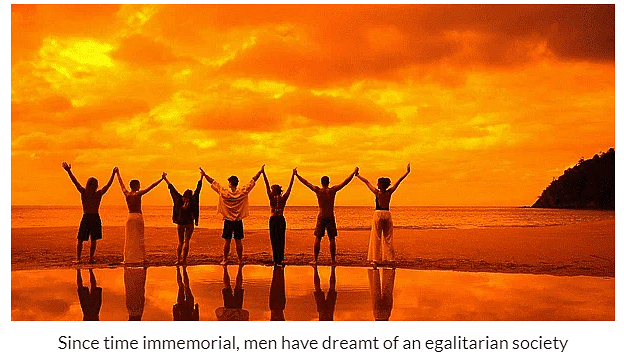Concepts- Equality | Sociology Optional for UPSC (Notes) PDF Download
Equality
Equality is a value closely associated with modernity and the process of modernization. It is often linked to the growth of the nation-state, political egalitarianism, and social justice. The concept of equality became more tangible through the slogan "Liberty, Equality, and Fraternity" during the French Revolution of 1789. In contrast, traditional societies – with the exception of primitive ones – such as the caste-based Hindu society or Western feudal societies based on the estate system, were predominantly unequal in nature.
- The concept of equality has its origins in the post-Renaissance and Enlightenment period and has evolved through various stages in history. It began with the demand for equality before the law during the French Revolution, where people protested against the exploitative estate system. This led to the demand for political equality, resulting in universal adult suffrage.
- Turner states that modern notions of equality are closely linked to the evolution of citizenship. As the criticism against the capitalist system grew, demands for socio-economic equality increased. Marxist scholars argued that without socio-economic equality, legal and political equality would be illusory. As a result, the welfare state emerged, and various reforms, such as land and tax reforms, were initiated to promote greater socio-economic equality.
- John Rawls, in his well-known work A Theory of Justice addresses the question of equality from a social justice perspective rather than merely as a political concept. Rawls acknowledged that society could not completely eliminate inequalities among its people, which result from factors such as inherited traits, social class, and personal motivation. However, he insisted that a just society should find ways to reduce inequalities in areas where it can take action. Rawls advocated for societies to strive for fair equality of opportunity for all its members by eliminating discrimination and providing access to education. In recent times, feminist scholars have been vocal about issues related to gender equality, extending their arguments to the rights of transgender individuals and the decriminalization of homosexuality.
- Equality is a complex concept with different implications depending on what is being apportioned. Foundational equality posits that humans are born equal in that their lives have equal moral value. Formal equality refers to individuals' legal and political rights and entitlements, such as legal and political equality. Equality of opportunity aims to ensure that everyone has the same starting point or equal life chances, necessitating the concepts of welfare state and social justice. In contrast, equality of outcome refers to an equal distribution of rewards, such as social equality and equal distribution of income and wealth.

- While foundational and formal equality are widely accepted in liberal-democratic societies, the idea of equality of outcome remains controversial. Arguments for social or material equality include promoting social cohesion, justice, freedom, and meaningful equality. However, arguments against social equality contend that it is unjust, leads to economic stagnation, infringes upon individual liberty, and results in uniformity at the expense of diversity.
Despite the long-standing dream of an egalitarian society, a society in which all members are equal, such a society remains elusive in reality.
Conclusion
Equality is a multifaceted concept that has evolved over time and holds different implications depending on the context. From its roots in the post-Renaissance and Enlightenment periods to its manifestations in political, social, and economic realms, the pursuit of equality has been a driving force in modern societies. While foundational and formal equality have gained widespread acceptance, debates surrounding equality of outcome continue. Although the dream of a completely egalitarian society remains unattainable, striving for greater equality in various aspects remains a crucial goal in the quest for social justice and progress.Frequently Asked Questions (FAQs) of Equality
What is the historical origin of the concept of equality?
The concept of equality has its origins in the post-Renaissance and Enlightenment period and became more tangible during the French Revolution of 1789 with the slogan "Liberty, Equality, and Fraternity."
How is the concept of equality linked to the evolution of citizenship?
Turner states that modern notions of equality are closely linked to the evolution of citizenship, which includes the demand for equality before the law, political equality, and eventually socio-economic equality as a response to criticisms of the capitalist system.
What is John Rawls' perspective on equality?
John Rawls addresses the concept of equality from a social justice perspective in his work 'A Theory of Justice.' He advocates for societies to strive for "fair equality of opportunity" for all its members by eliminating discrimination and providing access to education.
What are the different types of equality?
Some different types of equality include foundational equality, formal equality, equality of opportunity, and equality of outcome. Each type has different implications depending on what is being apportioned.
Why is the idea of equality of outcome controversial?
The idea of equality of outcome is controversial because, while it promotes social cohesion, justice, freedom, and meaningful equality, it can also be seen as unjust, leading to economic stagnation, infringing upon individual liberty, and resulting in uniformity at the expense of diversity.
|
120 videos|428 docs
|
















